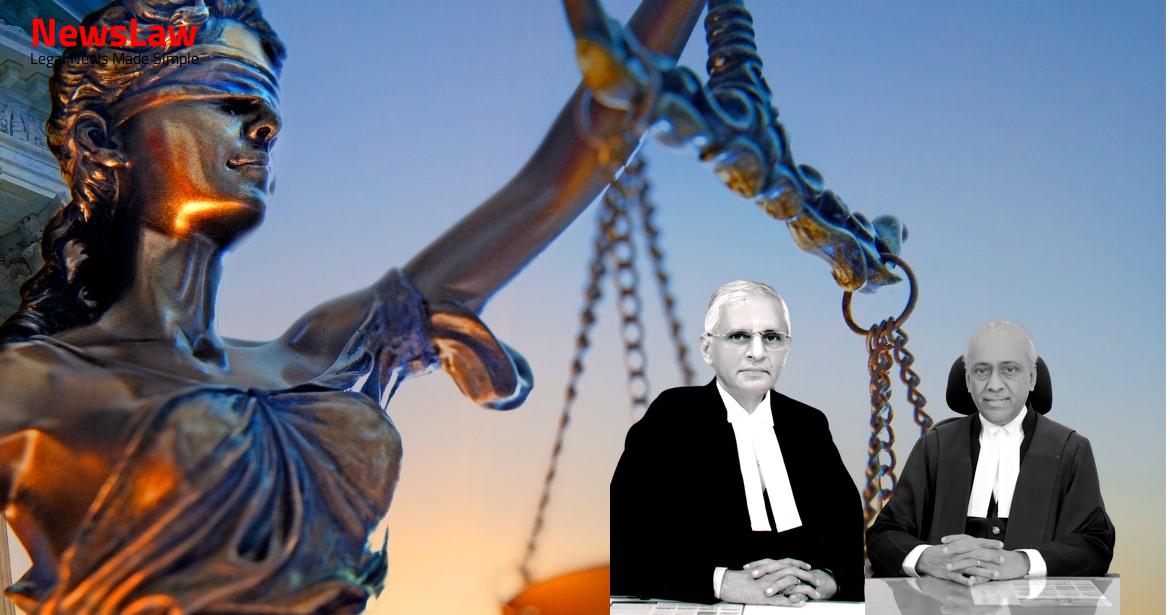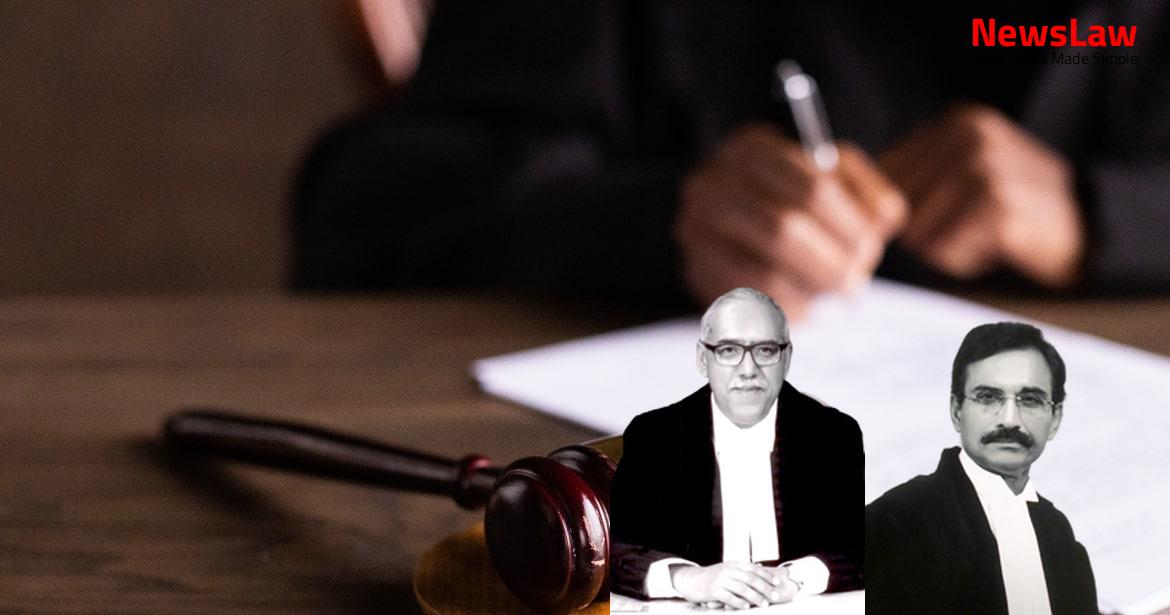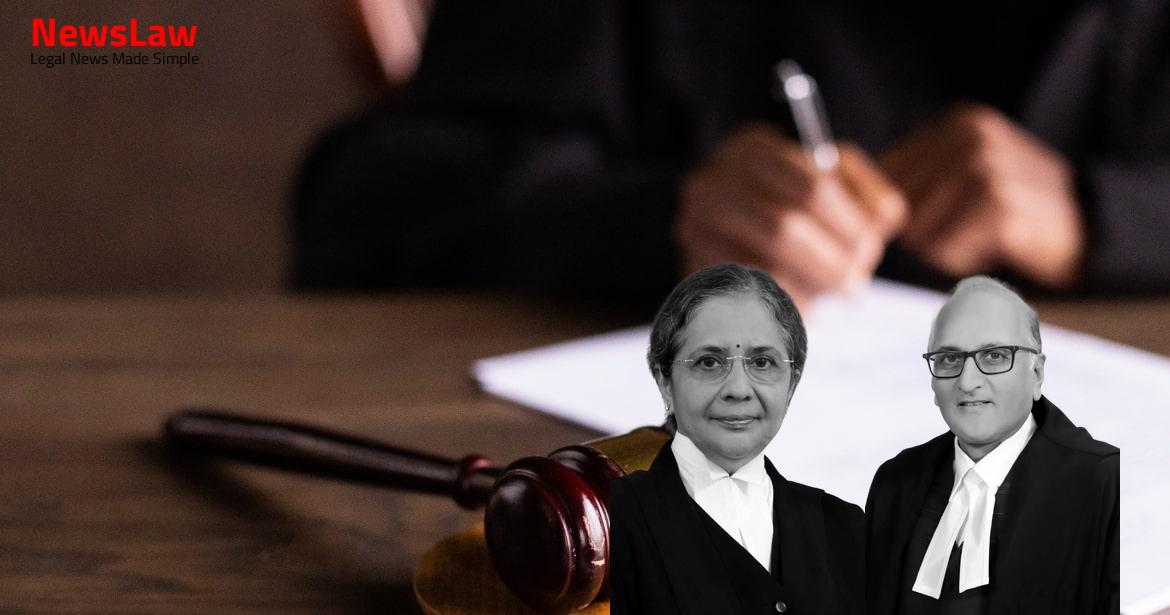Delve into the detailed legal analysis conducted by the court regarding the freezing of bank accounts under the Prevention of Money Laundering Act (PMLA). The court examined the procedural fairness and compliance with PMLA guidelines, emphasizing the importance of due process in such cases. This summary focuses on the court’s legal reasoning and conclusions, providing valuable insights into the complexities of freezing accounts under PMLA.
Facts
- The appellant is challenging the order dated 13.08.2020 passed by the High Court of Karnataka in WP No.8031 of 2020.
- The High Court’s order disposed of two writ petitions, with the focus on the freezing of the appellant’s bank account in Writ Petition No.8031 of 2020.
- The appellant raised the issue of their bank account being frozen in the writ petition before the High Court.
Also Read: Supreme Court Upholds Rejection of Plaint Under Order VII Rule 11 of CPC: A Critical Analysis
Arguments
- Notice was issued to the respondent for enabling necessary payment returnable within two weeks.
- The respondent appeared and filed a counter affidavit on behalf of respondent No.4.
- Arguments were presented by Mr. Mukul Rohatgi for the appellant and Mr. S.V. Raju for respondent No.4.
- The freezing of bank accounts belonging to the appellant has caused prejudice by withholding statutory payments and employee salaries.
- The Court limited the scope of consideration to the issue of defreezing the bank account to allow the appellant to make statutory payments.
Also Read: Validity of Debt and Enforcement of Section 138 NI Act
Analysis
- The High Court was justified in its reasoning and conclusion regarding the power and competence to initiate proceedings under the PMLA.
- The Enforcement Directorate froze the appellant’s bank accounts under the PMLA for alleged money laundering.
- The freezing of accounts must comply with the procedure outlined in Section 17 of the PMLA.
- The appellant challenged the freezing of accounts through a writ petition before the High Court.
- The High Court upheld the action under the PMLA but failed to ensure due process compliance.
- Contradictory statements were made by the Enforcement Directorate regarding the freezing of accounts under PMLA.
- The power of seizure under CrPC Section 102 does not validate the freezing of accounts under PMLA.
- Failure to follow the prescribed procedure under the PMLA renders the freezing of accounts unsustainable.
- The Enforcement Directorate’s actions did not adhere to the necessary legal requirements under the PMLA.
- Procedural fairness and compliance with the PMLA guidelines are essential in such cases.
- Section 17 of PMLA deals with search and seizure powers granted to the Director or authorized officers.
- The authorized officer can enter and search any premises where there is a suspicion of records or proceeds of crime related to money laundering.
- If necessary, the officer can break open locks, seize records or properties, and examine persons under oath.
- In cases where seizing property is not practical, an order to freeze the property can be issued, which can later be seized.
- The reasons for search and seizure or freezing must be recorded and forwarded to the Adjudicating Authority.
- The Adjudicating Authority retains the reasons and materials for a prescribed period.
- The authority can also seize evidence during a survey under certain conditions without prior authorization.
- Any records or properties seized must be filed before the Adjudicating Authority within thirty days for retention.
- Public orders made by public authorities should be construed objectively with reference to the language used in the order itself.
- Orders should not be interpreted based on subsequent explanations provided by the officer who made the order.
- Public orders are meant to have public effect and influence the actions of those to whom they are addressed.
- Contending to have exercised power under a specific statute when it was not mentioned in the order or affidavit cannot be accepted.
- Statutes providing for a particular manner of doing things must be strictly followed without deviation.
- The validity of an order must be judged by the reasons mentioned in it and cannot be supplemented by fresh reasons later on.
- Failure to exercise power as per the prescribed manner would lead to non-compliance with due process under law.
- Appellant pleads to defreeze account for paying statutory dues based on certificate from Chartered Accountant.
- Certificate indicates amount payable towards ITDS, PF, ESI, Professional Tax, Gratuity, and LIC employees’ deductions totaling Rs. 79,93,124.
- Court directs respondents to defreeze accounts and clear cheques for statutory dues, subject to availability of funds.
- Any surplus funds after payment of dues can be dealt with by respondent No.4 following required procedures.
Also Read: Enlargement on Bail in Illegal Mining Case
Decision
- The accounts bearing Nos. 914020014786978, 200006044354, and 39305709999 shall be defrozen.
- The appellant is allowed to make payments towards statutory dues using the defrozen accounts.
- Respondent No.4 has the liberty to initiate action afresh in accordance with the law, if desired.
- The communication dated 15.05.2020 is quashed.
Case Title: OPTO CIRCUIT INDIA LTD. Vs. AXIS BANK (2021 INSC 56)
Case Number: Crl.A. No.-000102-000102 / 2021



